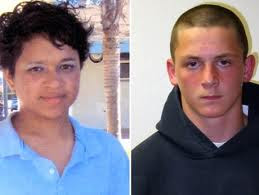Brandon McInerney, Teen Accused Of Killing Gay Student
Brandon McInerney, Teen Accused Of Killing Gay Student, Brandon McInerney was a scrawny 14-year-old from a broken home when he was accused of gunning down a gay classmate in front of stunned students at a Ventura County middle school.Three years later – and six months shy of legally becoming an adult – McInerney is going on trial on a charge of first-degree murder in the killing of 15-year-old Larry King. If convicted, he faces up to life in prison.
Opening statements are slated for Tuesday at a courthouse in the San Fernando Valley after a judge changed the venue.
Larry's death has roiled gay-rights advocates and parents in Oxnard, a city about 60 miles northwest of Los Angeles, where the shooting occurred in February 2008. They wondered why school officials hadn't done more to stop the harassment toward Larry by students, including McInerney. Larry's family sued the school district, among two dozen defendants, for failing to protect the teen.
The conflict between the two boys, who both had troubled upbringings, didn't seem out-of-place for teens coping with adolescence. There were taunts, teasing and on at least one occasion, a scuffle between Larry and McInerney, who purportedly tried to get others to beat up Larry.
What made the discord different from routine bullying is how Larry stood up for himself.
The day before the shooting, one of McInerney's friends told authorities that Larry uttered the words "I love you" as he passed McInerney in a hallway, according to court documents filed by prosecutors.
The friend said McInerney told him he was "going to get a gun and shoot (Larry)," according to court papers. One of Larry's friends claimed McInerney told her, "Say goodbye to your friend Larry, because you're never going to see him again."
The following day, as the boys sat in a computer lab, McInerney drew a .22-caliber gun from his sweatshirt and shot Larry in the back of the head.
McInerney "then stood up as Larry collapsed to the floor, looked around at his astonished classmates and delivered a second coup-de-grace shot into the back of Larry's head," prosecutor Maeve Fox wrote in court documents.
White supremacist materials were found in McInerney's bedroom, including books and drawings of swastikas. McInerney didn't attend a school field trip to the Museum of Tolerance, the educational arm of the human rights organization the Simon Wiesenthal Center, court records showed.
At a preliminary hearing last year, a police detective testified that Larry's sexuality was an affront to McInerney's ideology, and was probably the motive for the crime.
McInerney has pleaded not guilty to murder, lying in wait and a hate crime. Defense lawyer Scott Wippert has not returned calls and e-mails seeking comment. Wippert, however, told the Ventura County Star, that Larry sexually harassed McInerney and the shooting was committed in the heat of the moment.
Jurors will likely hear about the rough upbringings of both teens.
Larry, who told some people he was gay, lived at a center for abused and neglected children in the months before his death. Girls used him as a pawn to clear a table of boys at lunch, according to prosecutors. When Larry asked to sit with them, the boys got up and sometimes called him derogatory names.
McInerney came from an abusive household where his father, William McInerney, was sentenced for battery against his mother in 2000. William McInerney also was accused of shooting her in the elbow several months before his son was born.
He died in March 2009 of blunt-force head trauma at his home. The coroner ruled his death was accidental.
While McInerney will be tried as an adult because of the gravity of the alleged crime, some legal experts said the panel could be more lenient because of his youth.
"One, they recognize the younger you are, the more likely you are to be rehabilitated," said Tom Lyon, a professor of law and psychology at the University of Southern California. "And two, they see more impulsiveness in their actions."
Larry's death has gained some resonance around the nation, where vigils have been held in his memory. Thousands of comments were left on Internet sites dedicated to him in the weeks following the shooting.
Lyon said the tragedy could foster discussion between adults and children about intolerance.
"This kind of case is something students can discuss to deal with prejudices and alleviate them," he said.
Source: huffingtonpost
